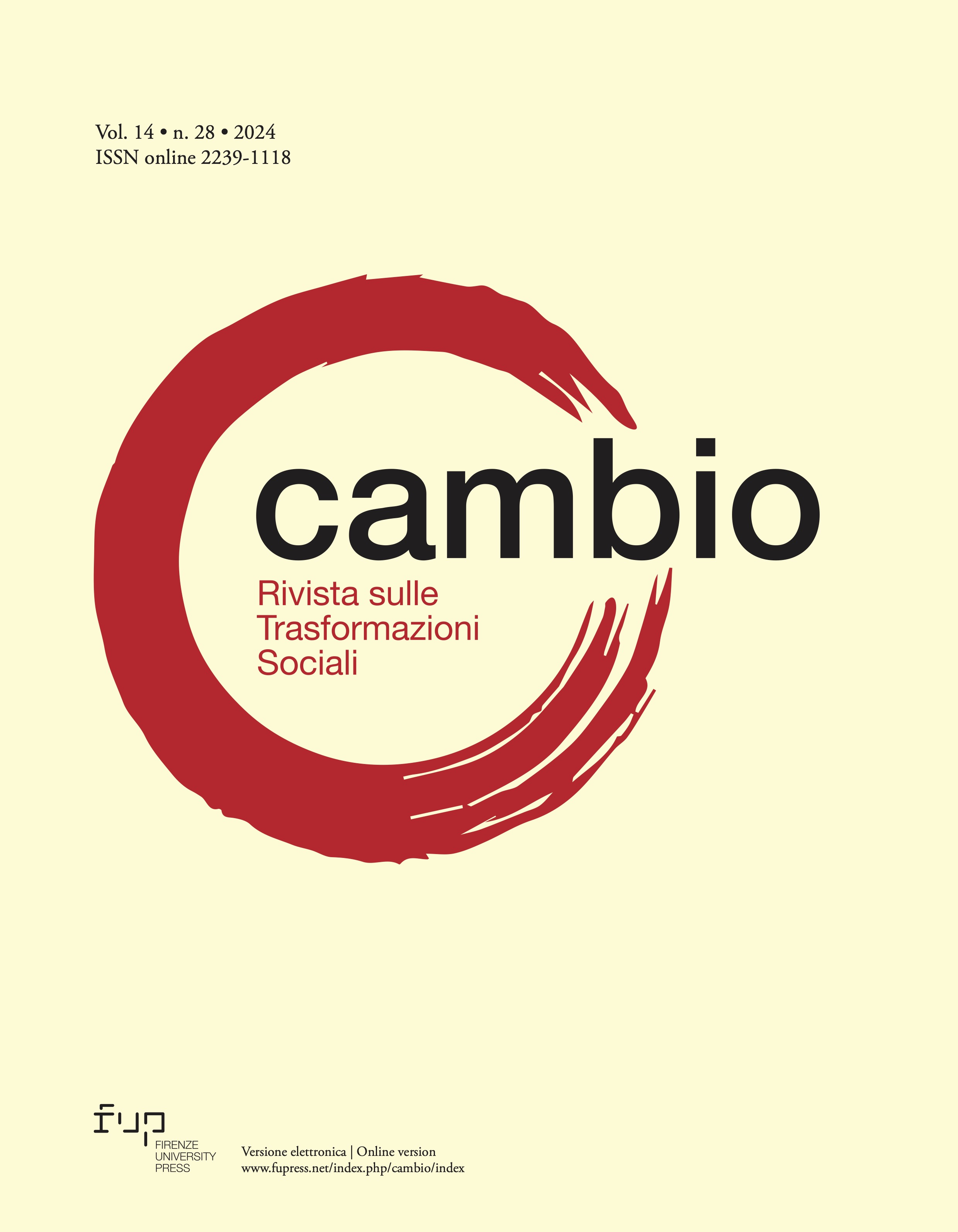Book Review - Standard
Annalisa Murgia. Hybrid Labour: Measuring, Classifying, and Representing Workers at the Boundaries of Employment and Self-employment
Published 2025-05-21
How to Cite
Armano, E. (2025). Annalisa Murgia. Hybrid Labour: Measuring, Classifying, and Representing Workers at the Boundaries of Employment and Self-employment. Cambio. Rivista Sulle Trasformazioni Sociali, 14(28), 193–197. https://doi.org/10.36253/cambio-17877
Copyright (c) 2024 Emiliana Armano

This work is licensed under a Creative Commons Attribution 4.0 International License.
References
- Armano E., Murgia A. (2017), Hybrid areas of work in Italy. Hypotheses to interpret the transformations of precariousness and subjectivity, in Armano E., Bove A., Murgia A. (cur.), Mapping Precariousness, Labour Insecurity and Uncertain Livelihoods: Subjectivities and Resistance, New York: Routledge. DOI: https://doi.org/10.4324/9781315593838
- Azaïs C., Dieuaide P., Kesselman D. (2017), Zone grise d’emploi, pouvoir de l’employeur et espace public: une illustration à partir du cas Uber, in «Relations industrielles», 72, 3, 433-456. DOI: https://doi.org/10.7202/1041092ar
- Bologna S. (2006), The Rise of the European Self-Employed Workforce, Milano: Franco Angeli.
- Boltanski L., Chiapello È. (1999), Le nouvel esprit du capitalisme, Paris: Gallimard.
- Bozzon R., Digennaro P., Mezihorák P., Borghi P., Mondon-Navazo M. (2025), in Murgia A. (cur.), Hybrid Labour, London: Routledge.
- Brown W. (2015), Undoing the Demos: Neoliberalism’s Stealth Revolution, New York: Zone Books. DOI: https://doi.org/10.2307/j.ctt17kk9p8
- Bureau M.C., Corsani A., Giraud O., Rey F. (cur.) (2024), Les zones grises des relations de travail et d’emploi. Un dictionnaire sociologique, Buenos Aires: Teseo. DOI: https://doi.org/10.55778/ts911693406c140
- Chen J.Y. (2023), Algorithmic Precarity: The Costs of Flexibility in Platform Work, in «Work, Employment and Society», 37, 2, 456-473.
- Cingolani P. (2021), La colonisation du quotidien, Paris: Éditions Amsterdam
- Corsani A. (2020), Chemins de la liberté. Le travail entre hétéronomie et autonomie, Paris: Ed. Croquant.
- Corte di Giustizia dell’Unione Europea (2023), Caso C-356/21 Yodel Delivery Network Ltd v. Workers, Lussemburgo.
- De Stefano V. (2016), The Rise of the ‘Just-in-Time Workforce’: On-Demand Work, Crowdwork, and Labor Protection in the ‘Gig-Economy’, in «Comparative Labor Law & Policy Journal», 37, 3, 471-504.
- De Stefano V. (2023), Platform Work and Labour Protection in the EU, Bruxelles: European Trade Union Institute.
- Dieuaide P., Azaïs C. (2020), Platforms of Work, Labour, and Employment Relationship: The Grey Zones of a Digital Governance, in «Frontiers of Sociology», 5, 2. DOI: https://doi.org/10.3389/fsoc.2020.00002
- Eurofound (2021), Platform Work: Maximising the Potential While Safeguarding Standards?.
- Europarlamento (2021), Proposta di direttiva sul miglioramento delle condizioni di lavoro nei lavori tramite piattaforma, Bruxelles.
- Huws U. (2019), Labor in the Global Digital Economy: The Cybertariat Comes of Age, New York: Monthly Review Press.
- Lorey I. (2015), State of Insecurity: Government of the Precarious, London: Verso.
- Mezihorák P. Murgia A. (2015), Representing and Organising the Solo Self-Employed in Europe: The Emergence of a ‘Relational Representation’ from the Combination of Prefigurative and Contentious Politics, in «Organization» (0), 1–20.
- Mondon-Navazo M., Murgia A., de Heusch S. (2024), Re-articulating autonomy and solidarity. The case of Smart: The largest European network of freelance cooperatives, in «Partecipazione e conflitto», 17, 1, 210-228. DOI: https://doi.org/10.1080/14747731.2025.2485788
- Murgia A. (cur.) (2025), Hybrid Labour: Measuring, Classifying, and Representing Workers at the Boundaries of Employment and Self-employment, London: Routledge. DOI: https://doi.org/10.4324/9781003353645
- Prassl J. (2018), Humans as a Service: The Promise and Perils of Work in the Gig Economy, Oxford: Oxford University Press. DOI: https://doi.org/10.1093/oso/9780198797012.001.0001
- Rosenblat A., Stark L. (2016), Algorithmic Labor and Information Asymmetries: A Case Study of Uber’s Drivers, in «International Journal of Communication», 10, 3758-3784.
- Scholz T. (2017), Uberworked and Underpaid: How Workers Are Disrupting the Digital Economy, Cambridge: Polity Press.
- Scholz T. (2020), Platform Cooperativism: Challenging the Corporate Sharing Economy, New York: Rosa Luxemburg Stiftung.
- Standing G. (2011), The Precariat: The New Dangerous Class, London: Bloomsbury. DOI: https://doi.org/10.5040/9781849664554
- Supiot A. (1999), Au-delà de l’emploi: Transformations du travail et devenir du droit du travail en Europe, Paris: Flammarion. DOI: https://doi.org/10.1111/j.1564-913X.1999.tb00185.x
- Srnicek N. (2017), Platform Capitalism, Cambridge: Polity Press.
- Sutherland W. (2023), Data and Worker Power: Strategies for Collective Bargaining in the Digital Age, London: Labour Research Department.
- Woodcock J. (2021),The Fight Against Platform Capitalism: An Inquiry into the Global Struggles of Food Delivery Workers, London: University of Westminster Press. DOI: https://doi.org/10.2307/j.ctv1ktbdrm

